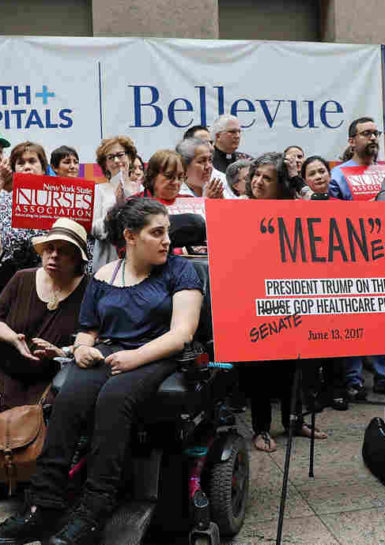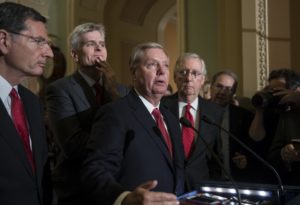
CBO Estimates 22 Million To Be Uninsured Under AHCA
The Congressional Budget Office predicts 22 million people will lose health insurance under the American Health Care Act currently in the hands of the Republican controlled Senate. The ACHA as designed would cut the deficit by over $320 billion which is 2/3’s more than the original itiration of the bill that was presented in Congress. Senate Republican Leader Mitch McConnell wants a vote on the bill within the next week.
Congressional forecasters say a Senate bill that aims to repeal and replace the Affordable Care Act would leave 22 million more people uninsured by 2026.
That’s only slightly fewer uninsured than a version passed by the House in May.
Monday’s report from the nonpartisan Congressional Budget Office could give moderate senators concerned about health care coverage pause. Sen. Susan Collins, R-Maine, was quick to register her opposition to the bill.
I want to work w/ my GOP & Dem colleagues to fix the flaws in ACA. CBO analysis shows Senate bill won’t do it. I will vote no on mtp. 1/3
Senate Republican Leader Mitch McConnell wants a vote on the bill this week, before senators head home for the July Fourth recess. With Senate Democrats united in opposition, Republicans can afford to lose only two votes on their side and still pass the bill.
Sen. Dean Heller, R-Nev., who is up for re-election next year, had already expressed reservations about the number of people who could lose coverage under the GOP bill. Four other Republican senators have complained that the bill doesn’t go far enough in rolling back the Affordable Care Act, also known as Obamacare.
According to the CBO, the Senate bill does reduce the deficit by $321 billion over the next 10 years, which $202 billion more than the House version that passed last month.
The Senate bill would cut hundreds of billions of dollars in taxes over the coming decade, with most of the savings going to those at the top of the income ladder. At the same time, it would phase out the Affordable Care Act’s Medicaid expansion, while offering less generous subsidies to those who purchase health insurance on the individual market. That combination is expected to reduce the number of people with insurance coverage by 15 million in 2018 and 22 million by 2026.
The CBO says low-income Americans in their 50s and early 60s would be disproportionately likely to lose their health care coverage under the Senate bill.
Although people buying insurance in the individual market would see lower premiums in many cases, the policies would cover less, and out-of-pocket costs would be higher.
“Despite being eligible for premium tax credits, few low-income people would purchase any plan,” the CBO said.
The Trump administration challenged the findings.
“The CBO has consistently proven it cannot accurately predict how healthcare legislation will impact insurance coverage,” said an unsigned statement from the White House. “President Trump is committed to repealing and replacing Obamacare, which has failed the American people for far too long.”
For months, the administration has pointed to rising insurance premiums and reduced competition among insurers to argue that a replacement for the ACA is urgently needed.
However, CBO forecasters predict the insurance market will remain stable for most of the country, with or without the Senate bill. The report notes that government subsidies under Obamacare help to insulate most purchasers from rising costs.
Steve
Steve is an affordable multifamily housing professional that is also the co-founder of Whiskey Congress. Steve has written for national publications such as The National Marijuana News and other outlets as a guest blogger on topics covering sports, politics, and cannabis. Steve loves whiskey, cigars, and uses powerlifting as an outlet to deal with the fact that no one listens to his brilliant ideas.



